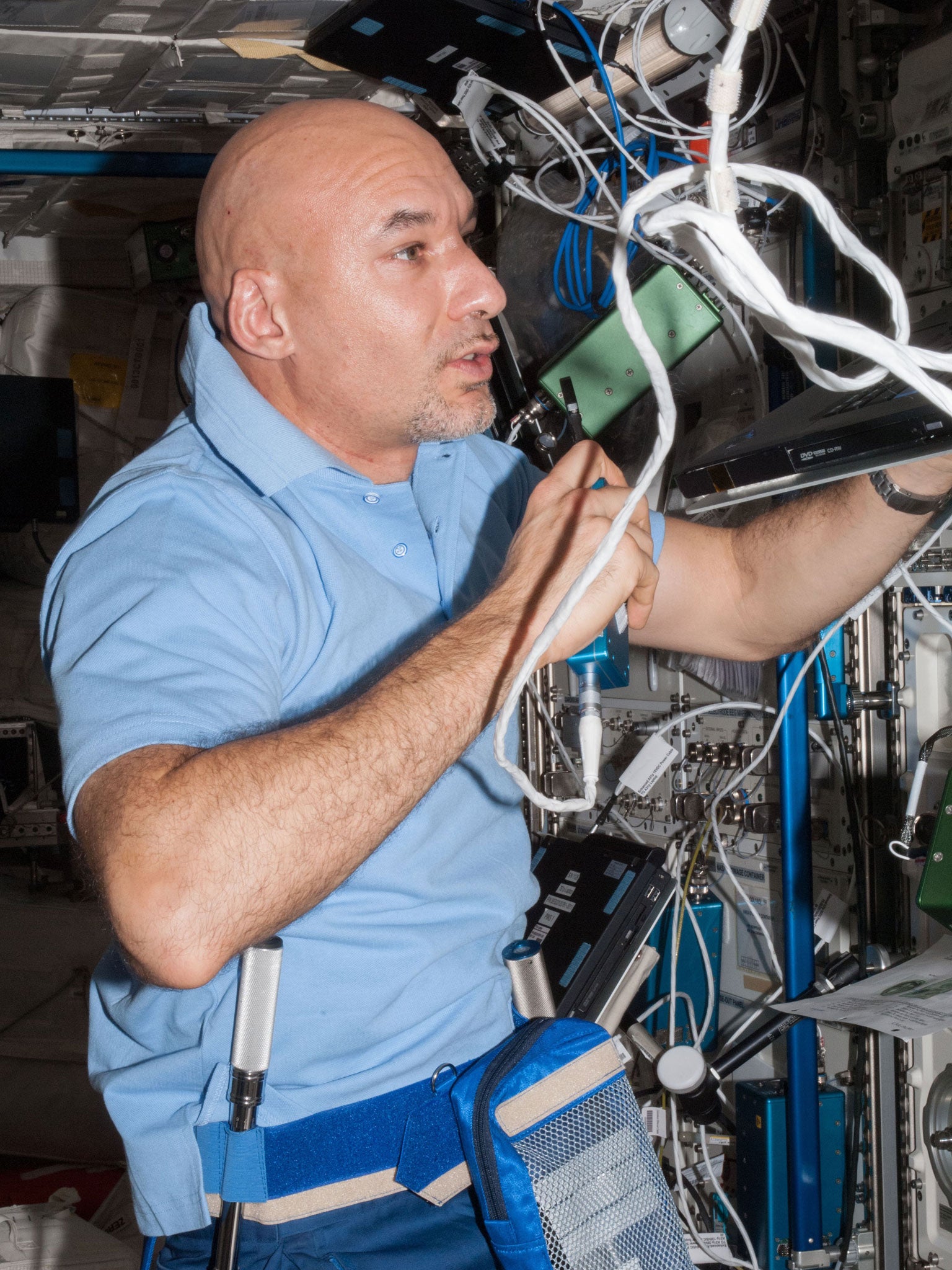‘I might lose consciousness... but it would be better than drowning in the helmet’: Italian astronaut almost lost in space
Major Luca Parmitano, 36, who nearly died during a spacewalk on 16 July, has told of his thoughts as he tried to save himself. Writing on his blog, the Italian Air Force officer, tells how his helmet suddenly began filling with water during a spacewalk from the International Space Station, to install power cables with a fellow astronaut, American Chris Cassidy. NASA has suspended all US spacewalks as it continues to investigate the problem

“My eyes are closed as I listen to Chris counting down the atmospheric pressure inside the airlock – it’s close to zero now. I feel fully charged, as if electricity and not blood were running through my veins. I’m mentally preparing myself to open the door because I will be the first to exit the station this time round.
“It is pitch black outside, not the colour black, but rather a complete absence of light. I drink in the sight as I lean out to attach our safety cables.
“I have to connect [the cables] to the station’s external sockets while at the same time securing them to the surface of the station with small metal wires. After a little initial difficulty, I inform Houston that I have completed the task and I’m ready for the second cable.
“At this exact moment, just as I’m thinking about how to uncoil the cable neatly (it is moving around like a thing possessed in the weightlessness), I ‘feel’ that something is wrong.
“The unexpected sensation of water at the back of my neck surprises me – and I’m in a place where I’d rather not be surprised. I move my head from side to side, confirming my first impression, and with superhuman effort I force myself to inform Houston of what I can feel, knowing that it could signal the end of this EVA [extra-vehicular activity].
“On the ground, Shane confirms they have received my message and he asks me to await instructions. At first, [Chris and I are] both convinced that it must be drinking water from my flask that has leaked out through the straw, or else it’s sweat. But I think the liquid is too cold to be sweat, and more importantly, I can feel it increasing.
“When I inform Chris and Shane of this, we immediately receive the order to ‘terminate’ the sortie. I’m instructed to go back to the airlock.
“Together we decide that Chris should secure all the elements that are outside before he retraces his steps to the airlock, ie he will first move to the front of the station. And so we separate. As I move back along my route towards the airlock, I become more and more certain that the water is increasing. I feel it covering the sponge on my earphones and I wonder whether I’ll lose audio contact. The water has also almost completely covered the front of my visor, sticking to it and obscuring my vision.
“By now, the upper part of the helmet is full of water and I can’t even be sure that the next time I breathe I will fill my lungs with air and not liquid.
“To make matters worse, I realise that I can’t even understand which direction I should head in to get back to the airlock. I try to contact Chris and Shane.
“I listen as they talk to each other, but their voices are very faint now. I can hardly hear them and they can’t hear me. I’m alone. I frantically think of a plan. It’s not much, but it’s the best idea I have: to follow the cable to the airlock.
“Finally, with a huge sense of relief, I peer through the curtain of water before my eyes and make out the thermal cover of the airlock: just a little further and I’ll be safe.
“Moving with my eyes closed, I manage to get inside and position myself to wait for Chris’ return. I sense movement behind me; Chris enters the airlock and judging from the vibrations, I know that he’s closing the hatch.
“Now that we are repressurising, I know that if the water does overwhelm me I can always open the helmet. I’ll probably lose consciousness, but in any case that would be better than drowning inside the helmet.
“The minutes of repressurisation crawl by and finally, with an unexpected wave of relief, I see the internal door open and the whole team assembled there ready to help.
“Space is a harsh, inhospitable frontier and we are explorers, not colonisers. The skills of our engineers and the technology surrounding us make things appear simple when they are not, and perhaps we forget this sometimes. Better not to forget.”
Luca Parmitano’s ESA blog is at: blogs.esa.int/luca-parmitano/e
Subscribe to Independent Premium to bookmark this article
Want to bookmark your favourite articles and stories to read or reference later? Start your Independent Premium subscription today.

Join our commenting forum
Join thought-provoking conversations, follow other Independent readers and see their replies